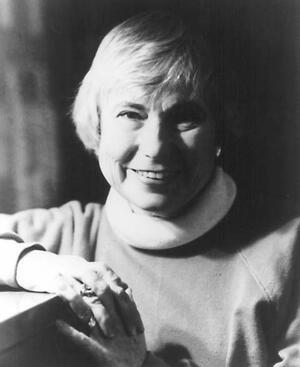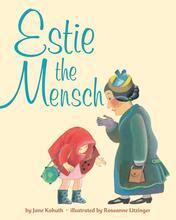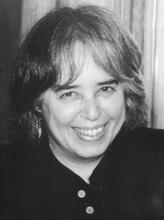Barbara Cohen
In her children’s books, Barbara Cohen confronted taboo subjects of assimilation, racism, and cancer with both sensitivity and remarkable honesty. She wrote predominantly on Jewish themes: a boy banned from bar mitzvah classes because his mother isn’t Jewish, a friendship between Israeli and Palestinian boys, and perhaps her most famous work, Molly’s Pilgrim, where a Jewish girl discovers how to connect her immigrant roots to the Thanksgiving story instead of feeling she has to erase her identity in order to belong. Cohen wrote 32 books and continued to push boundaries until the end: two years before her death from cancer, she published The Long Way Home, about a young girl dealing with family tensions after her mother’s mastectomy.
When Barbara Cohen died, she left behind an exceptional body of children’s literature. Cohen was adventurous, seldom repeating herself, always trying new ideas, settings and themes. “I’m an impatient person,” she said. “I don’t like doing the same thing twice.” The result of this prolific impatience was 32 books for children and young adults covering a wide range of topics, ranging from unique adaptations of biblical stories such as The Binding of Isaac (1978), I Am Joseph (1980), The Donkey’s Story (1988), and David (1995) to skilled retellings of Chaucer in Four Canterbury Tales (1987).
Her most familiar territory, however, was stories about Jewish children and young adults, past or present, faced with the universal dilemmas of growing up. “You don’t start to write a book about grand subjects,” Cohen once said. “You write about specific people doing specific things in specific places at specific times and hope they rise to a level of universal relevance. For me, those people happen to be Jews.”
Early Life & Education
Barbara Cohen was born in Asbury Park, New Jersey, on March 15, 1932, the first of three children of Florence (Marshall) and Leo Kauder. Inspired by “a family that admires a good story,” she started writing as soon as she could hold a pencil. Her father died shortly after the family moved to Somerville, New Jersey, to run an inn, and her mother, left with children aged nine, seven, and not quite five, raised them in this run-down hotel as she gradually built it into a successful business. Although she provided a stable and secure home, Cohen has said, “We were Jewish in a town where antisemitism was still close to the surface. My mother worked at a time when most other mothers didn’t. And she worked not in a school or an office but selling liquor and renting rooms to strangers. All these things served to make me feel isolated from other kids my age and forced me to depend on my brother, sister and books.”
After Somerville High, Cohen attended Barnard College. While a senior, she was invited to provide a column of personal commentary for her stepfather’s weekly newspapers, thus earning her first paycheck for writing. She graduated from Barnard magna cum laude and Phi Beta Kappa in 1954 with a BA in English and a concentration in creative writing. She married Gene Cohen in 1954 and while he joined her mother in running the now bustling inn, she earned her MA from Rutgers University in 1957, had three daughters (Leah, 1957; Sara, 1962; and Rebecca, 1963), and taught high school English in Tenafly, Somerville, and Hillsborough, New Jersey. Active in community and Jewish life, her only writing for many years was a column “Books and Things” published in New Jersey papers.
Early Writing Career
Cohen’s first picture book, The Carp In The Bathtub (1972) was published when she was 39 years old. The praise it received inspired her to stop teaching and write full time but she never anticipated that her simple story of two children trying to rescue a fish named Joe from his destined place in the seder meal would become a much loved modern classic. It is anthologized in hundreds of fourth grade readers and has been translated into many languages.
Cohen’s work sensitively depicts the inevitable strains of family life and outside pressures. Three of her early stories are set in a New Jersey inn of the forties and fifties, each told from the viewpoint of one of the innkeeper’s three children. They are R—My Name is Rosie (1978); The Innkeeper’s Daughter (1979, paperback 1990), the most directly autobiographical of her works; and Thank You, Jackie Robinson (1974), an American Library Association Notable Book. Bitter Herbs and Honey (1976) is another work which strongly reflects the sense Cohen always had as an adolescent of being an outsider.
Jewish Themes
The award-winning King of the Seventh Grade (1982) introduces Vic, the terror of the pre-bar mitzvah class, who is released from studying when the rabbi discovers his mother isn’t Jewish. Indignant, he chooses to formally claim his identity as a Jew, going through conversion and the call to Torah. In First Fast (1987), ten-year-old Harry fasts all day on Yom Kippur only to have the big boys renege on letting him play with them as they had promised if he succeeded. Their betrayal rings as true as his private pride in his achievement.
Unicorns in the Rain (1982), a futuristic fantasy based on the Noah story, clearly showed Cohen’s concern about the increasingly violent society she saw evolving around her. Molly’s Pilgrim (1985, 1998), one of her most timeless and well-loved stories, portrays a young Russian Jewish immigrant who sensitizes her class to the real meaning of Thanksgiving and religious freedom. In 1986, the film version, frequently shown on TV at holiday time, won an Academy Award for live short subject. Cohen, who played the crossing guard in one scene in the film, attended the Awards ceremony with sheer delight.
In The Secret Grove (1985) Cohen mused over the neutral ground a young Jewish Israeli and an Israeli Arab youth find in an orange grove between their villages. Yussel’s Prayer (1981), a beautifully told tale of a shepherd boy’s simple faith, received the National Jewish Book Award and the Association of Jewish Libraries (AJL) Sydney Taylor Award for picture books in 1981. In 1982, AJL also acknowledged Cohen’s overall contribution to Jewish children’s literature with their AJL Sydney Taylor Body-Of-Work Award.
The Christmas Revolution (1987) was one of the books which grew from her own children’s activities. In it, the Berg twins are confronted with the familiar but troublesome December dilemma of whether to take part in their predominately Christian school’s traditional holiday observances. Their unexpected disagreement about the right course of action becomes so painful that only dramatic events can resolve the tension. Then, in 1990, Cohen wrote The Long Way Home (1990) in which Sally Berg, one of the twins of The Christmas Revolution, faces the fear and family tensions that result from her mother’s recent mastectomy.
Death & Legacy
To the end, Barbara Cohen had a story to tell. She died of cancer on November 29, 1992, leaving behind books since published posthumously and a fine new crop of young women writers she helped inspire.
Cohen’s books touched the concerns of all children, which she described as the longing to belong, to be accepted and loved, to find out who one is and what one is worth. Her work did not protect young readers from separation, loss, failure, and death, but it always acknowledged what she called “the sense that the world is new, wonderful, fresh.”
Awards
Association of Jewish Libraries Sydney Taylor Body-of-Work Award (1980).
Sydney Taylor Picture Book Award (1981).
Additional Works by Barbara Cohen
Benny. William Morrow, 1977.
Coasting . William Morrow, 1985.
Even Higher. Lothrop, Lee & Shepard, 1987.
Gooseberries to Oranges. Lothrop, Lee & Shepard, 1982.
Here Come the Purim Players. Lothrop, Lee & Shepard, 1984.
The Orphan Game. Lothrop, Lee and Shepard, 1988.
People Like Us. Random House Children’s Books, 1989.
Seven Daughters and Seven Sons. Harper Collins, 1982.
Tell Us Your Secret. Delacorte Books for Young Readers, 1989.
Holtz, Sally Holmes. "Barbara Cohen." In Junior Authors and Illustrators. New York: H.W. Wilson, 1983.
“Obituary.. In Something About the Author Autobiography Series. Volume 74, Detroit: Gale Research Company, 1993, 49.
Desmond, Stephen. "Barbara Cohen, 1932–1992." In Something About the Author Autobiography Series. Volume 77, Detroit: Gale Research Company, 1994, 33–37.





